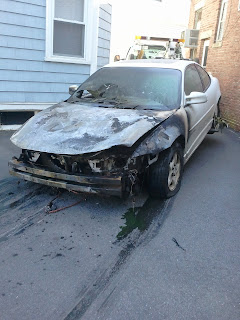Today was an especially busy day. A car explosion set my neighbors house on fire. 911 was called and Salem Firefighters arrived quickly on the seen to put out the fire to both car and house. Fortunately the damage to the house was centralized, The exterior of the house got the worst of it and the car was totaled. The experience not only left the home owner shaken but also all of us, neighbors about what could have been.
Here are 5 key things you can expect after a house fire and what you can do to prepare for them in advance.
Find a Temporary Place to Live
Unless your house fire was extremely small, your home will suffer extensive smoke damage throughout, even if contained to a single room. This smoke, coming from burning wood, plastics and other items in your home is toxic to humans and animals and should not be inhaled too long. Even if you think it's not that bad, you should really consider staying somewhere else until the the damage has been repaired - especially if you have young children. While some homeowners' and renter's insurance policies will pay for temporary lodging, most will not. This is an addendum to the policy that must be added before the fire happens that many people do not think of.
Continue Paying the Mortgage
Even if you have to move out of the home for a month or two while extensive repairs are being made and you are paying for another place to live like a hotel room or a temporary apartment, many banks and mortgage companies will insist that you stay current on your payments, though some may be generous and offer you a deferment. Don't count on it though, and be prepared to continue making your regular payments. You can prepare for this with a good emergency fund that includes the amount of your monthly mortgage payment in it.
Get an Advance on Your Personal Property Insurance
Once the insurance underwriter gets a look at the damage to your home - especially if you are put out of your house due to the extent of the damage, you can expect perhaps a 5%-10% advance on the maximum amount allowed by your personal effects coverage to help you with your living expenses until you can formally complete your claim and receive payment for your loss. If the insurance adjuster doesn't offer this to you up front, ask about it.
Provide a Detailed List Of Your Loss
This is the way personal effects insurance works: You suffer a loss, you produce the list of what you lost, how much you paid for it, when you bought it and what you expect its value is today. Most people severely underestimate how long the process is and how difficult it can be to remember and catalog all of their possessions. Sure you can think of your washer and dryer, fridge and television set and dining room table and couch, but what about all of the books on your bookshelves? Your DVDs? The toys in your children's rooms? Submitting a list with "200 science fiction paperback books: $1,000 estimated value" will get you exactly $0 in most circumstances. The best way to manage this expectation is to keep an inventory in advance (take a few weeks to do it) or use a camcorder to do a slow, video sweep of your entire house, thereby cataloging all of the items in it. Then store this tape off-site at a friend or relative's house.
The Insurance Company Will Likely Devalue Your List
If you have a $30,000 personal effects policy, for example, you may be tempted to come up with $30,000 worth of losses (probably harder than you think), and be done with it, but this will probably land you less than you expect. The insurance adjuster is going to take your list, go over it carefully, and then apply a depreciation formula to it, knocking something like 10% to 20% off of the final total that you've come up with. While this is no excuse to commit insurance fraud by outright lying by what items you have in your house, don't be afraid to tell the truth about an item's complete value, and think carefully about what items are worth. If you recently bought a $1,000, computer, for example, then put that down, but don't forget to add the $250 worth of software you bought and installed on it as well. Every penny counts - you can be sure the insurance company sees it that way.


No comments:
Post a Comment